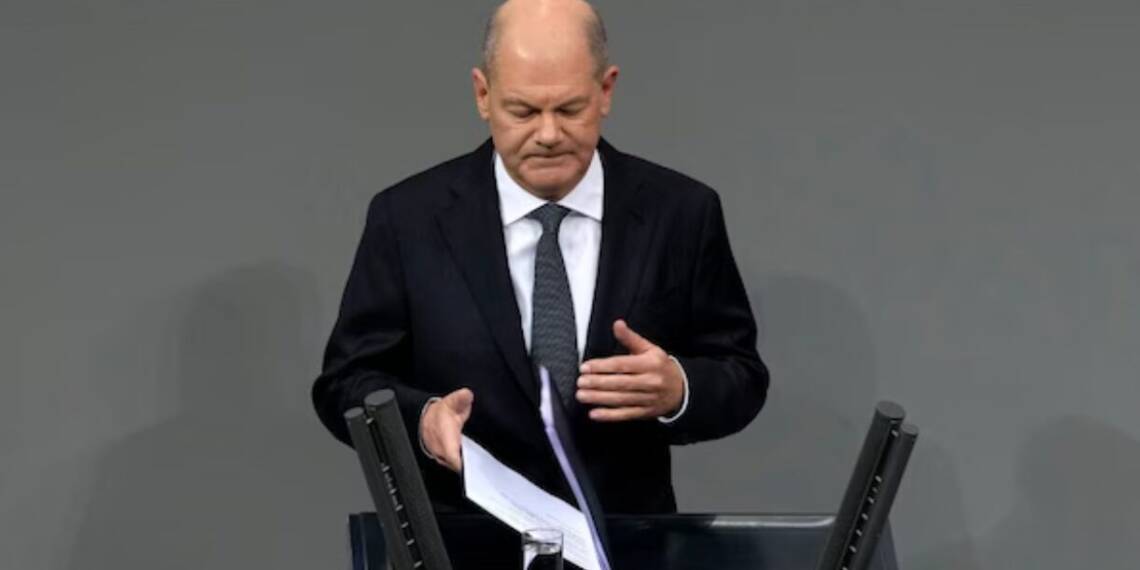The resignations are the new black in Western politics! In last few hours, Canada’s Freeland jumped ship before Trudeau’s titanic goes down completely, and over in Germany, Scholz is getting a masterclass in political humiliation.
Poor Olaf – the wannabe European godfather who thought he could play chess with geopolitics – just got checkmated by his own coalition. The man who strutted around as Ukraine’s knight in shining armor is now reduced to a caretaker chancellor, watching his political capital evaporate faster than vodka at a Russian diplomatic party.
Germans, known for their precision engineering, have engineered Scholz’s perfect political downfall. His grand vision of being Europe’s tough guy? More like Europe’s biggest political punchline. Ukraine, which he championed so passionately, seems to have become his political kryptonite.
We are now 60 days away until elections – and this is a writing on the wall. We Predict today that the countdown to Scholz’s political obituary has officially begun.
OLAF SCHOLZ’S GOVT. COLLAPSE
Who knew pushing Europe into a full-blown war would be career suicide? Germany’s political drama just hit peak soap opera. Olaf Scholz got absolutely demolished in a confidence vote that is nothimg
Out of 733 parliamentary seats, the “great leader” managed a pathetic 207 votes, while 394 lawmakers basically showed him the exit door.
The backstory behind this downfall is also very interesting. Last month, Germany’s political landscape dramatically shifted when Chancellor Olaf Scholz unexpectedly fired his Finance Minister, Christian Lindner, during a high-level government meeting. This decision came after months of internal tensions within the three-party coalition.
The firing triggered an immediate response from Lindner’s Free Democratic Party (FDP), which withdrew all its ministers from the cabinet within hours. This action effectively ended the coalition government composed of the Social Democrats, Greens, and FDP.
Government insiders had hoped that potential international political developments, such as Donald Trump’s potential electoral victory, might encourage unity. However, the internal discord showed no signs of resolution.
UKRAINE BECOMES THORN FOR ‘TRAFFIC-LIGHT’
Scholz requested that Lindner provide a strategy to protect the German economy following the conflict in Ukraine. Lindner, however, remained against Scholz’s proposal. He and his party, the FDP, believe that German concerns for Ukraine cannot be compromised. But he reiterated his support for Ukraine.
Thus, Lindner’s dismissal and the coalition’s eventual dissolution brought to light long-standing disputes over governance and economic policies. The action caused political unrest in Germany’s biggest economy and paved the way for an early election.
Germany is now headed for an early election on February 23rd – seven months ahead of schedule. The constitution’s quirky rule means President Steinmeier must now decide whether to dissolve parliament, a decision he has 21 days to make.
But honestly what a fall this has been for the German Chancellor. In 2021, he stormed to popularity on the fall of former Chancellor Merkel. Once in coalition now, SPD decided to ditch Merkel’s party and paved a new coalition with FDP and the Greens.
However, the coalition was always fraught with differences as they were three different ideologies trying to come together.
The “traffic light” coalition – named after the color-coded parties of SPD (red), FDP (yellow), and Greens – was essentially a political pressure cooker waiting to explode. Marketed as a “progressive alliance” after the 2021 election, the coalition was fundamentally built on incompatible political philosophies.
SCHOLZ WIPEOUT LOOMS: POLLS PREDICT
Scholz’s government inherited a perfect storm of challenges. Russia’s invasion of Ukraine forced Germany into a delicate geopolitical balancing act – supporting Ukraine militarily while desperately avoiding direct confrontation. This diplomatic tightrope walk was just the beginning.
The subsequent fallout was brutal: an energy crisis erupted, inflation soared, the economy nosedived, and Europe’s asylum policies became increasingly contentious. To top it off, the far-right saw unprecedented electoral success, further destabilizing the political landscape.
And guess the result? This became the most unpopular German government since World War II. Months of public infighting, strategic disagreements, and internal backstabbing completely eroded public trust. People are fed up of the constant support for Ukrainians.
What started as an ambitious coalition of progressive parties ended up being the most abhorred govt of Europe. And hey Mr. Scholz, Let us tell you… For you, the worst is yet to come.
Despite catastrophic opinion polls predicting a total wipeout for his party, Olaf Scholz is showing a stubborn determination to fight. But here’s the real kicker – the more terrifying prospect is the Alternative for Germany (AfD) potentially emerging as a power broker.
AfD’S LAST-DITCH ATTEMPT
The AfD, widely labeled as Europe’s most anti-Ukraine and Nazi, could become the real game-changer in these upcoming elections.
Scholz’s political career is now life support. His legacy is shaping up to be a masterclass in political self-destruction. From mishandling the Ukraine war to economic mismanagement, he’s systematically dismantled his own political credibility.
The upcoming elections aren’t just a test for Scholz, but a critical moment for Germany’s political soul. With the AfD & CDU After him, the outlook for the chancellor looks grim.
Scholz might be fighting, but it looks more like a last desperate stand than a genuine comeback








